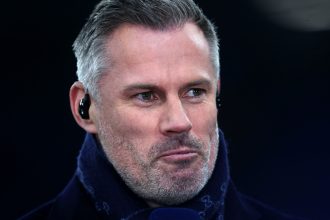Wednesday Convo with the former USMNT boss on the current state of the team, the new head coach, expectations
There are only a handful of people who can properly understand the weight that has been placed on Mauricio Pochettino's shoulders. Maybe less than an handful. That's because Pochettino wasn't just hired to be the U.S. men's national team head coach, but also the face of men's soccer in America.
He's a big-name, experienced, successful coach brought in to both redefine a sport and culture while navigating all of the quirks and nuances that make this sport in this country it so unique. Oh, and he's also doing so with a World Cup looming.
It does sound familiar, doesn't it?
While no one can quite speak to the job ahead for Pochettino, who will lead the U.S. into the World Cup on home soil in the summer of 2026, there is one man who can offer first-hand perspective on what it's like to be appointed as American soccer's game-changer. There is one coach who knows what it's like to bring a combination of fame and experience into that locker room, hoping to use it to change the game for the better.
That man, of course, is Jurgen Klinsmann. And just like everyone else who follows American soccer, the former USMNT coach is paying close attention, eager to see where Pochettino can take this team. Klinsmann, who led the U.S. from 2011-16, was one of the coaches that laid the foundation for this program – and even in an ever-evolving national team, that foundation is solid. Parts are always being painted over or chipped away, of course, but the base remains.
And even though the Pochettino era is just two games in, Klinsmann believes the foundation is stronger than ever before for a coach who has the skill, reputation and belief to reach new heights.
"It's a really fulfilling job," Klinsmann tells GOAL. "It's fulfilling because you share it with a lot of your colleagues, your staff and the fans. You realize that it means a lot to not only fans but to people all over the United States, whether they coach youth soccer or work in the professional game. I've never seen so many text messages on my phone in my life as the night we beat Mexico in Mexico City in 2012. I realized at that moment, 'Woah, that's how much it means to American soccer people to finally beat Mexico on their ground.'
"Year by year, I learned a lot and, for Mauricio, it's an even faster learning curve because he has a deadline. The deadline is June 2026, opening game. He has to prepare them quickly, in a very short amount of time, in the best way possible."
And that's the mission, plain and simple. U.S. Soccer and Pochettino have publicly outlined their objectives for 2026: reach the quarterfinals of an expanded World Cup, at minimum. More if possible. And Klinsmann thinks that's achievable.
"I think every one of the coaches that had the opportunity over the last few decades, if it's Bruce [Arena], if it's Bob [Bradley], if it's now Mauricio, if it's Gregg [Berhalter], you want to have a feeling that this country is ready to go further in a World Cup than ever before," Klinsmann said. "I think a lot of players now share that feeling. They feel it's doable."
GOAL sat down with Klinsmann to discuss Pochettino, the USMNT coaching role, and all that comes with it in the latest Wednesday Convo.
Getty Images SportON THE USMNT COACH'S RESPONSIBILITIES
GOAL: When you're USMNT coach, you're not just a coach, you're also a figurehead and a representative of American soccer. What's that like?
Klinsmann: I looked at it as a huge learning experience, but also an opportunity to build something. National team programs are a little bit different than club teams and it depends a lot on what you're doing and your relationship with the people that lead them – the Federation. I had a fantastic relationship with Sunil Gulati and Sunil also wanted stuff to happen off the field. He wanted to change things in coaching, education connecting with the college system, connecting globally. He wanted the program to measure itself with the Europeans, the South Americans, and so he had a bigger picture view. I shared that.
You can work 36 hours a day in it and go crazy or you can limit it to a few hours and say, 'I just focus on the main things'. I think for Mauricio, the focus is on the main things. "I have the team now under my guidance, and I have to prepare them for the biggest World Cup in history with 48 teams, so I have to figure out what is the demand once the World Cup starts. How do I prepare that team? What are the opportunities I get in terms of friendly games?" Because that's one problem, obviously, with Mexico and Canada, too, is you don't play real competitive games, really. It's tough. That's what I was fighting for all the time. I said, "Send me to Europe, send me to South America, let me give me a Copa America." I was begging them all the time.
It's a fascinating job. It's a job that fills you with a lot of pride because it's a unique country. Everybody is looking at the United States, no matter if it's in an economical way, in political way or in an athletic way. This country is discussed up and down everywhere in the world, good sides and the bad sides. It is a huge honor at the end of the day, too, and I hope that he takes it all in, that he enjoys every day of it and, obviously, we keep fingers crossed that he's making it successful as well.
AdvertisementAFPON THE FIRST CAMP
GOAL: Pochettino just finished his first camp. What were your first camps like and how did you set your expectations?
Klinsmann: My own expectations are always the same: I want to go into every game and win it. No matter if I play in Italy or Brazil or wherever, I want to win the game. I'm not going there to tie. My approach was always that when we go to Honduras or we go to Mexico, we try to win it, and then if, in the end, it's a tie, then it's a tie. You get a lesson, which we did get a couple of lessons against Brazil, for example, and Argentina! Then take those lessons and understand the difference between those situations. I had to learn these lessons over those couple of months quickly.
I sensed it then, that in a certain way, it was always OK to get a tie away from home. I couldn't live with that. It was not me. No, we go and if you lose, which we did in Honduras again, then we lost it, that's fine. What's the difference between zero and one point? It's not much difference, but if I can go for three points and bring home three points, that equals three ties!
I tried to change that. I tried to tell them, "Listen, we are good enough to win anywhere we want to if it's the right day and we do what we want to do and we just try it." I wanted to build a higher level of confidence in a certain way.
USA Today SportsON COACHING IN AMERICA
GOAL: What was it like leading a country as unique as the U.S., both on and off the field?
Klinsmann: What makes the U.S. job so fascinating is that you have to deal with so many different characters and backgrounds of players. It's just fantastic. You get the kid from Texas, you get the kid from New Jersey, you get the California kid…It's just so cool, you know?
Then, when you are in camp, I enjoyed camp so much with these guys, because they were all characters. Like DaMarcus Beasley is such an entertainer. Oguchi Onyewu… you had so many fascinating characters in there like the Kyle Beckermans and Nick Rimandos of the world. You get the people from MLS joining the European group and so on. I think Beasley played in Mexico at that time, too.
You just want to hug them all day long. It's just a different chemistry. It's a chemistry of people that just want to do something different from what was done before. We all tried to do it a bit differently.
Getty Images SportON QUALITY COMPETITION
GOAL: You really pushed for the USMNT to play high-level games. That'll be hard without World Cup qualifying. How should the U.S. handle it
Klinsmann: For Mauricio, the challenge still remains the same old story: for Mexico, Canada and the U.S. to get highly competitive games every couple of weeks. September, October, and November, the Europeans and South Americans, they beat the sh*t out of themselves. You watch (Lionel) Messi playing in Bolivia or in Colombia, what they do to him, but he's on the field. He goes there and he knows he's getting tortured, but he's going there because he's playing for his country, so the meaning that it has the national team is huge. This is something that you want the U.S. to reflect as well.
Mexico, I think they know it. They feel it a bit more intense, especially when they play in Mexico. It's a different volume. I always told Sunil, "Let us play Mexico at least once or twice a year, in Mexico and not in the U.S." But obviously there's the financial thing, so it didn't make sense.






